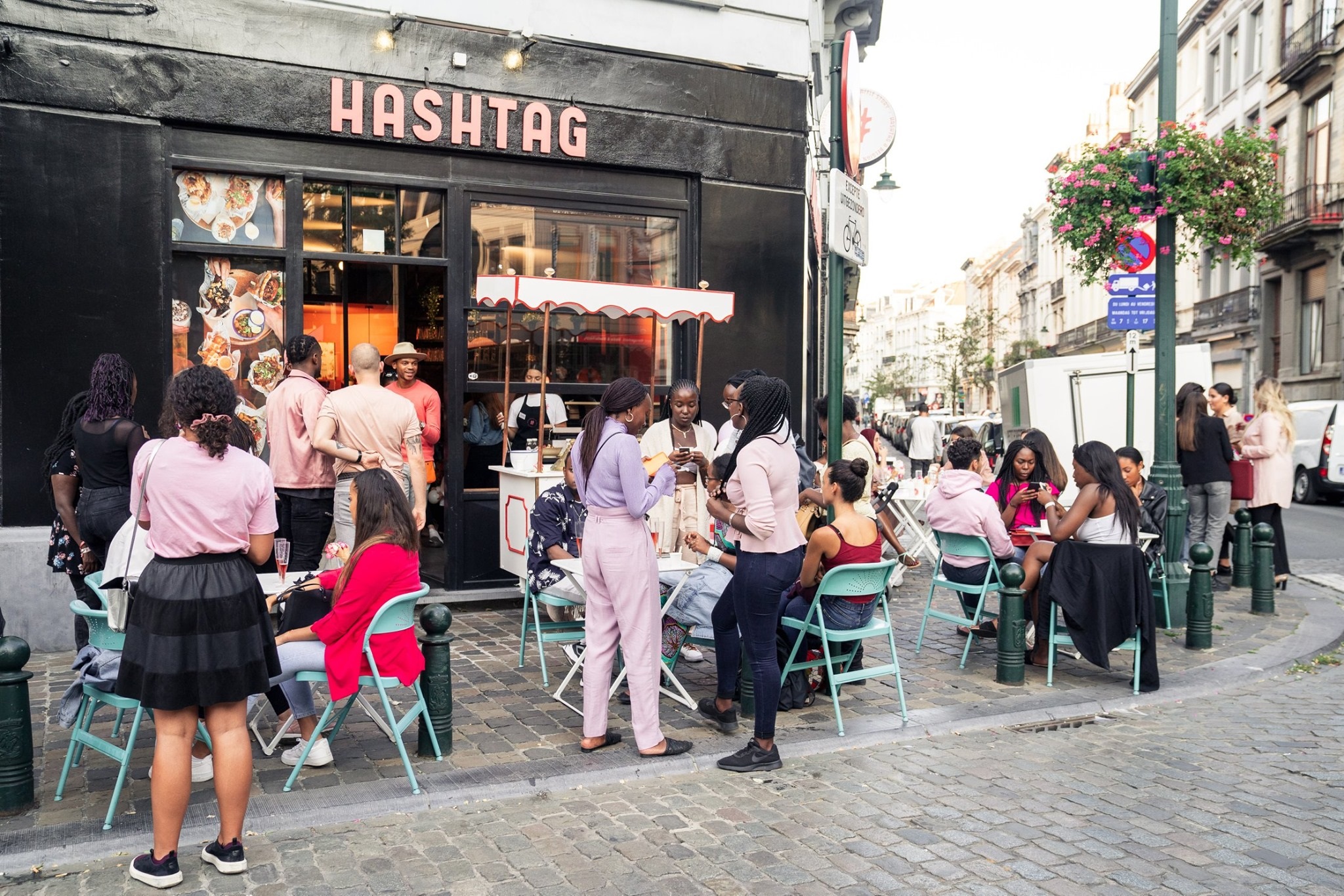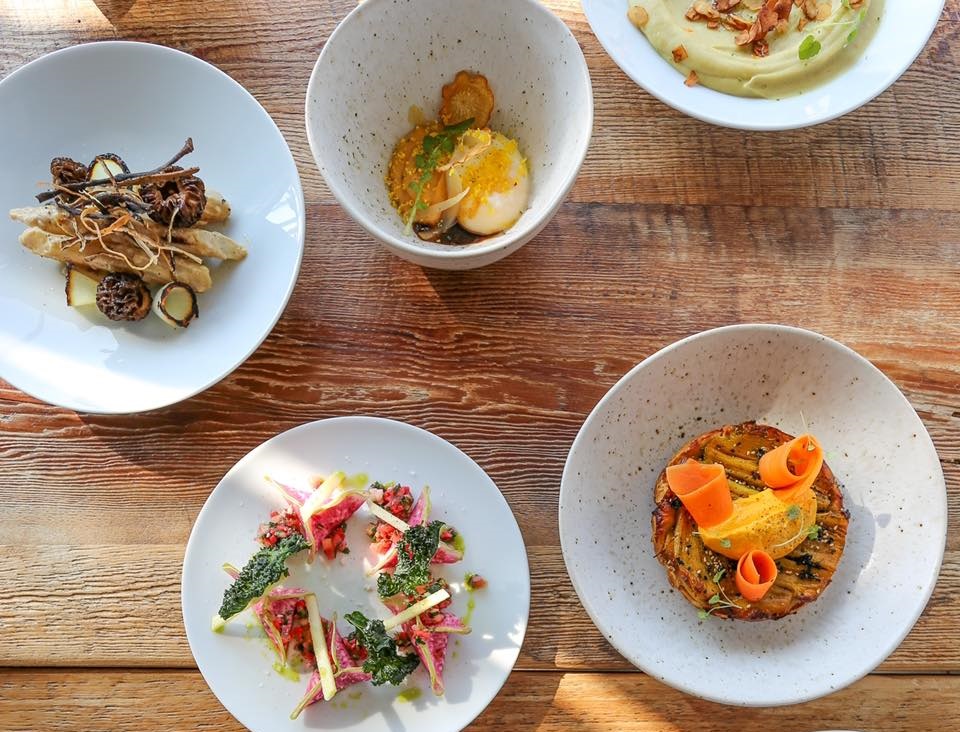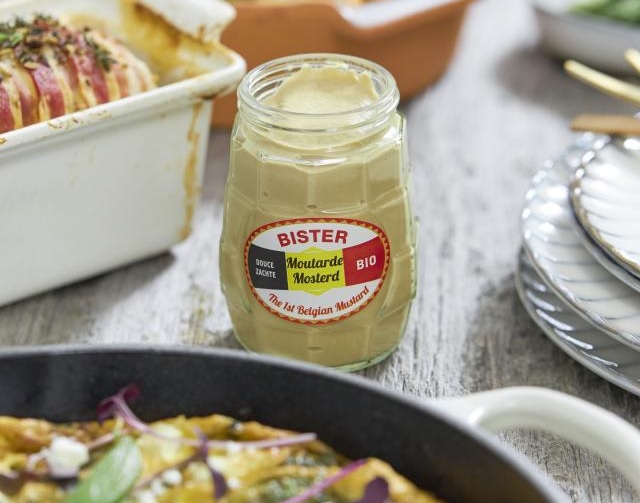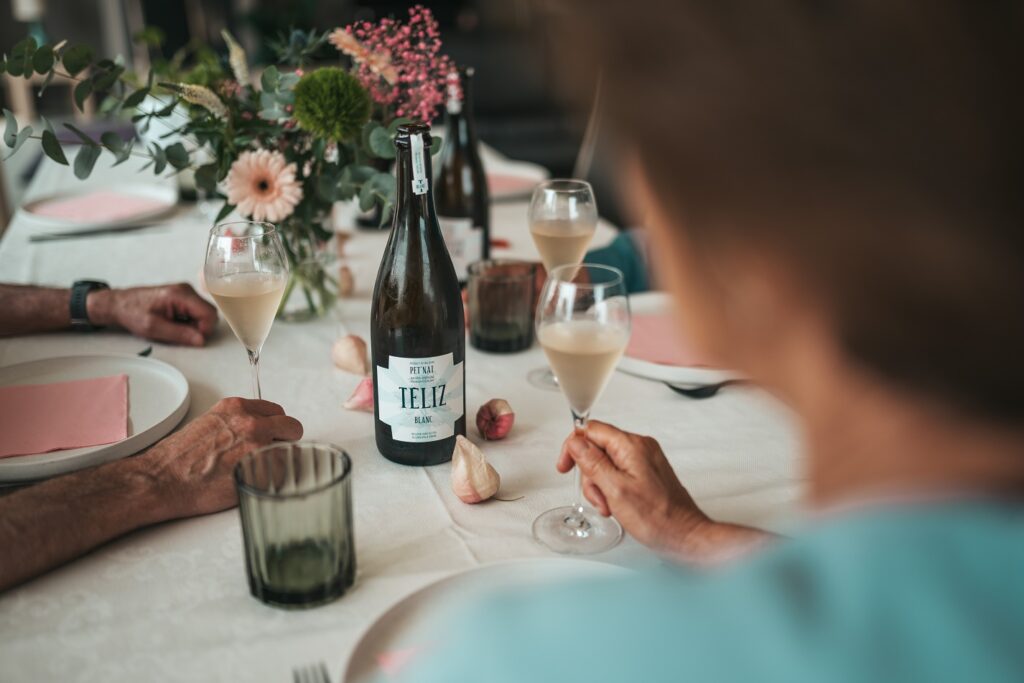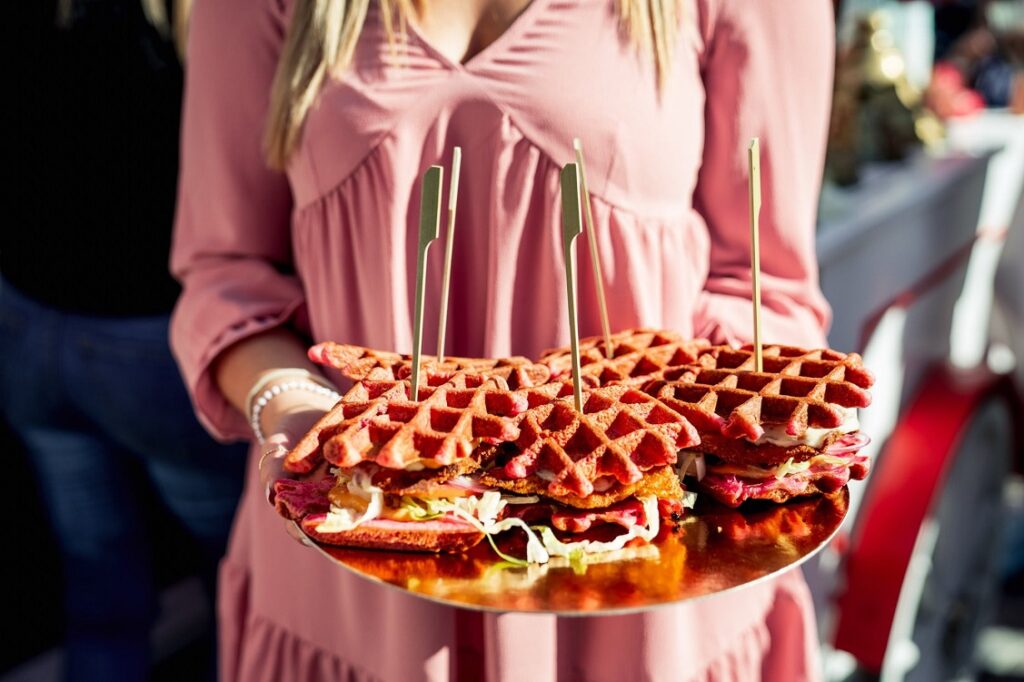Restaurant: Tero
The Tero group was created by two brothers, Nicolas and Arthur Lhoist, who merged their businesses: in addition to restaurants and catering, which is what we’re most interested in, they also work in events, sport, lodging and even a digital app for corporate engagement.
Tero also owns a farm in Wallonia – Ferme des Rabanisse – where they grow not only vegetables and honey but also Duroc pigs, Parthenaise cows, Ardennes sheep and laying hens. Four-fifths of the farm production feeds the Tero restaurants. The ingredients that are not sourced within the group come directly from carefully selected artisans like BIGH, an urban farm based on the roof of Anderlecht slaughterhouse, which grows herbs and vegetables, and hosts a rainbow trout fish farm.
Thanks to this sourcing model, the Tero restaurant in Saint-Gilles lets you experience a genuinely sustainable cuisine.
The menus are inspired by tapas restaurants, where guests share various dishes. At Tero, you pay for quality, with prices from €13 to €19 for each dish, which includes both hot and cold options. At lunch, a unique dish (meat-based or vegetarian) is also available for €21.
We loved the red onion tatin and the breaded pork, and our favourite dessert, a bitter chocolate cream with quince jam and toasted pecan nuts, is a must-eat! The list of mostly organic, biodynamic or natural wines allows for great pairings. The menu is fully seasonal and changes every three months. Service is very casual: all waiters and waitresses wear a grey T-shirt, jeans and sneakers.
Tero has become a pioneer in the farm-to-fork field, showing that it is possible for a restaurant to master most of the supply chain. It’s a niche today, but it could set a standard that attracts other visionary food entrepreneurs. In any case, Belgium is the perfect country for such ventures with its quality agriculture, its entrepreneurship spirit in the food sector, and its diverse and curious customers.
Tero 1, Rue Saint-Bernard 1060 Saint-Gilles
Food: Mustard
One of the first things newcomers learn about Belgians is their strange use of mustard. Yes, in Belgium, beer comes with finger food like little cubes of gouda-type cheese that you dip in mustard (locals will look at you with a mocking eye, however, if you ask for the same mustard for your fries – there’s mayonnaise for that).
Mustum ardens has always had a place of choice in Belgian cuisine - for example, to spice up a lapin à la flamande (Flemish-style rabbit stew) or spread on gingerbread slices to pimp a carbonade (beef stew). Veal kidneys also pair marvellously with mustard-flavoured sauce. Thanks to the floury character of the crushed seeds, mustard is a great asset when you need to thicken a sauce or make an emulsion.
Belgium boasts a few producers, of which the oldest are Wostyn (south of Bruges) since 1869 and Tierenteyn-Verent (Ghent) since even earlier. Don’t be fooled if you see fields covered by the yellow flowers of mustard plants in the summer, however: most of the time it is used as fallow crop rotation between two seasons. In fact, Belgian production barely covers 5% of the local needs, and most of the seeds are imported from Canada, the number one world producer.
When global production plummeted in 2021, though, some Belgian mustard producers such as Bister sought local alternatives. They partnered with Farm for Good farmers to produce organic Belgian mustard seeds and it paid off. Today, the country’s most popular mustard manufacturer, Bister offers a 100% Belgian-sourced mustard among its already rich range. A newcomer, Moutarde de Dion from Beauraing near the French border in southern Wallonia, also recently launched two mustards made from locallysourced seeds and Belgian cider vinegar.
In Saint-Gilles, Richard Schafer, the owner and chef of Le 203, also created the sauce brand must! during covid lockdowns. His products include a rare American-style mustard (i.e. sweet), XXX Mild Mustard, and an incredible mustard seeds pickle called Poor Man’s Caviar. With a hint of spice and tang, the latter is the perfect addition to salads, cheese boards (!), sauces and meats.
Finally, let’s not forget local brand Brussels Ketjep and its famous Mostoed (“mustard” in Brussels’ local dialect), which works with a hot dog, as well as sauerkraut or also with a cheese platter accompanying your beers.
Drink: Téliz
I wrote a few months ago about a new generation of non-alcoholic drinks coming to the market. Today, the drink sector is literally bubbling with innovations, underpinned by a demand for healthier and tastier party drinks. And Belgium is at the forefront of this trend.
Ghost in a Bottle, a small company from Hoeilaart, launched a gin (Ginetical) in 2015 with the help of the oldest distillers of the realm. Then came a wooded gin, three non-alcoholic gins (No Ghost in a Bottle), and many rums aged in Belgium. A few years ago, the company also launched an incredible sweet sparkling drink with a hint of vinegar: Féliz. The drink was already unlike anything in existence, testimony to the ability of its creator, Ludwig Lampaert, to juggle plant flavours and aromas.
But Lampaert has hit new heights with Téliz, a blend of bottle-fermented teas and infusions. His initial briefing was so simple: to create a unique non-alcoholic dry drink to accompany food. It had to be sparkling, as bubbles compensate for the absence of alcohol to give more body to a zero drink. Lampaert was originally a winemaker in Flobecq, who also made sparkling wine, and used his experience with the new assignment.
All the sugar would be transformed, in the closed bottle, into carbon dioxide by yeast. This process has a name: méthode ancestrale or pétillant naturel, where, contrary to méthode traditionnelle or champenoise, the lees (dead yeast) stays in the bottle. It still produces a tiny quantity of alcohol due to the fermentation of sugar, but well under the 0.5% legal limit to call it a ‘non-alcoholic drink’ – in other words, as much as in a very ripe banana.
The process takes two weeks and the result is stunning: zero sugar and a perfectly balanced flavour. The “white” version includes a blend of 18 teas and plants and can be used like a sauvignon blanc wine to accompany white meat, vegetables and fish. The “rosé” version includes eight teas and plants, and can accompany vegetables, tomato sauce dishes, creamy fish, white meat and cheeses with a delicate flavour. It costs around €15/75cl bottle and is sold in Brussels at Mig’s World Wines near Place Stéphanie and UpperWine in Woluwe-Saint-Lambert.
Café: Hashtag
The eternal quest for urban foodies is the perfect brunch place. Hashtag combines accessibility (right in the centre of town, provided you don’t come by car!), the peace of Place du Jardin aux Fleurs and the possibility of an extended terrace when weather allows it. Inside, it’s small (30 seats) but the mobile green plastic plants allow for the flexibility of space use and privacy management. The music is chill and the service is friendly.
The excitement comes more from inside the plates: traditional burger buns have been replaced by waffles! Yes, Liege-type waffles without the sugar, of course. Another particularity is that the food is all halal, which encourages a diversity of customers. They are very fresh and tasty, and you can choose their style to accompany your fried chicken (the only meat available at Hashtag’s in addition to turkey bacon): chilli, BBQ, Mexican or truffle. Fries are either traditional or sweet potato, and in addition to ketchup, mayo and BBQ can be enjoyed with sauces Dallas, aioli, truffle mayo or guacamole. We were so stuffed that we couldn’t try the fries with three cheeses, sorry.
Brunch-style dishes are served all day long with various combinations of raw vegetables, eggs, chicken, turkey bacon and salmon. Prices are decent, but you have to add a drink. Cold options include milkshakes and two blends of sparkling wines and juice or lemonade, and hot drinks can be picked from a nice range of coffees and teas.
Hashtag is friendly, simple and efficient, the perfect destination for a tasty moment in a quiet square in a town centre every day from 12.00 to 21.30, and from 12.00 to 22.00 every Friday and Saturday, but especially during the weekend, when you must absolutely book in advance.
Hashtag Burgers & Brunch Rue Pletinckx 55, 1000 Brussels

